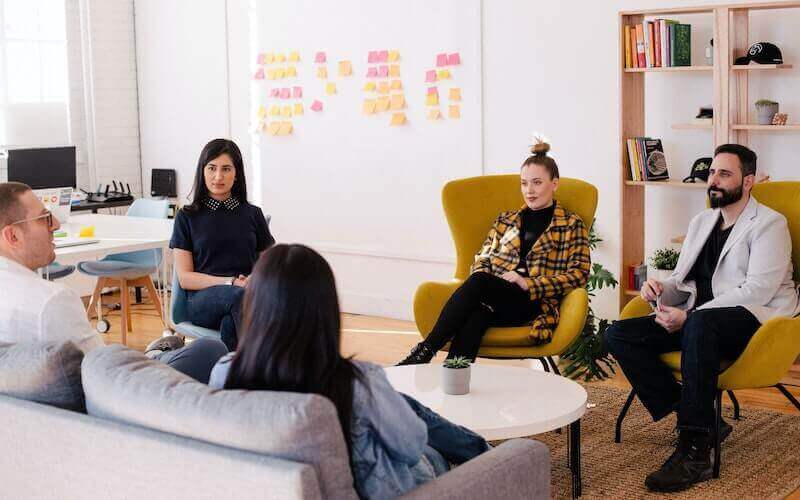Coaching
Experienced,
compassionate coaches
inspire thought and action
One-on-one coaching can be an effective way to help your organization’s leaders identify, develop and achieve goals. Coaches empower individuals by providing structure, support and feedback. As a result of coaching, leaders build self-awareness, develop their capabilities, set clearer goals, and take action toward those goals.
Inclusity’s professional coaches are certified in a number of coaching and counseling approaches and methodologies. Like all of our services, we customize coaching to fit the needs of the individual and/or organization.

Many thanks for all your effort during our 1:1 coaching sessions. Not only did I truly appreciate the Inclusity workshop, but our sessions were invaluable at continuing my learning and hopefully increasing my skills as a leader through understanding my team better.
Gain clarity. Develop skills. Achieve more.
Coaches empower leaders by providing structure, support and feedback. As a result of coaching, leaders build self-awareness, develop their capabilities, set clearer goals, and take action toward those goals.
Inclusity’s professional coaches are certified in a number of coaching and counseling approaches and methodologies. They create a confidential, relaxed environment for leaders to comfortably explore areas that can enhance their inclusive leadership.
Depending on their goals, coaching participants may work to gain increased self-awareness, develop greater adaptability to change, improve communication or interpersonal skills, or manage conflict.
The Coaching Process
Sometimes consultants start work with a new client assuming they know what the problems are. Inclusity does the opposite; we assume nothing. We rely on both the qualitative and quantitative data we gather to form a comprehensive picture of an organization’s existing culture and needs.
Depending on the client’s needs, Inclusity uses various tools to audit an organization’s culture, including focus groups, one-on-one interviews, analysis of existing data, and surveys.
Assessment
Starting with diagnostic assessments sets the stage for personal discovery.
Identifying Goals
What do you want to specifically achieve? Your coach will help you identify meaningful, actionable goals.
Develop an Action Plan
With your coach, you will create a plan that outlines strategies and tactics to achieve your goals.
Measure Progress
As you work toward your goals, your coach will check in periodically to check on your progress.
Follow-Up
Your coach will help you figure out how to sustain change moving forward after the coaching engagement ends.
Inclusity Coaching Diagnostic Tools
The Enneagram Assessment
The Enneagram Assessment is a basic personality test with nine different categories of personalities numbered from 1 through 9. Each number represents a unique personality type with its own characteristics, strengths, weaknesses, motivations and fears. The Enneagram is a helpful tool for clients to use to understand themselves and the people in their lives. It shows a range of healthy to unhealthy behaviors that each personality type might exhibit unconsciously.
As our clients understand more about their personality type, they are able to develop ways of recognizing stressors and unconscious reactions that might be inhibiting them from using their natural gifts at work. The Enneagram can help clients improve their skills in understanding diverse ways of thinking and feeling about certain situations. It brings a layer of empathy, grace, and compassion as it opens up doors for understanding others with different characteristics.
The Enneagram Assessment includes nine descriptive paragraphs. Clients are asked to read all of the paragraphs, and then select the top three that best describe them. The assessment takes less than fifteen minutes to complete.


CliftonStrengths Assessment
The CliftonStrengths Assessment measures talents and helps identify clients’ greatest strengths and areas of potential for building strengths. The online assessment utilizes 177 pairs of potential self-descriptors. Clients have 20 seconds to assess their selection and then the assessment moves on to the next item.
The CliftonStrengths Assessment stems from positive psychology, which focuses not on fixing what is wrong, but rather focusing on what works. Clients learn to maximize their strengths while building on potential strengths and minimizing their areas of weakness.
The CliftonStrengths Assessment takes an average of 30-45 minutes to complete.
The Inclusity 360 Assessment
This assessment helps participants better understand themselves, their strengths, and growth opportunities. The tool gathers feedback about an individual from multiple perspectives, resulting in a well-rounded view. Feedback will be anonymous and combined with responses of at least four additional individuals. The collective assessment results will help guide an individual’s professional development.
This process allows leaders to gain a holistic view of each participant’s leadership effectiveness. The five main areas of focus are relationship dynamics, inclusive leadership/DEI, empathy/emotional intelligence, communication style/effectiveness, and feedback.
The Inclusity 360 Assessment takes an average of 15-20 minutes to complete for each participant.

Want More Info?
Take a look at this handout for more details, and feel free to print and share with colleagues.
What Our Clients Say
Your insights have truly helped me to further my understanding of and appreciation for the team’s ability to bring their authentic selves to work, and I am appreciative for the interpersonal skills you have provided to me as I manage a large team with many different personalities and navigate on a leadership team.
I appreciate all the coaching on the enneagram, and I employ these insights regularly as I strive to lead and build the marketing team so that we may deliver something truly meaningful to our patients and our organization.
As part of my reflection and development, I believe I gained a lot throughout this coaching experience including improved emotional intelligence. I most enjoyed learning about new leadership philosophies and attitudinal models, however, just being real with someone outside of the organization was beneficial.
View Dates & Register
